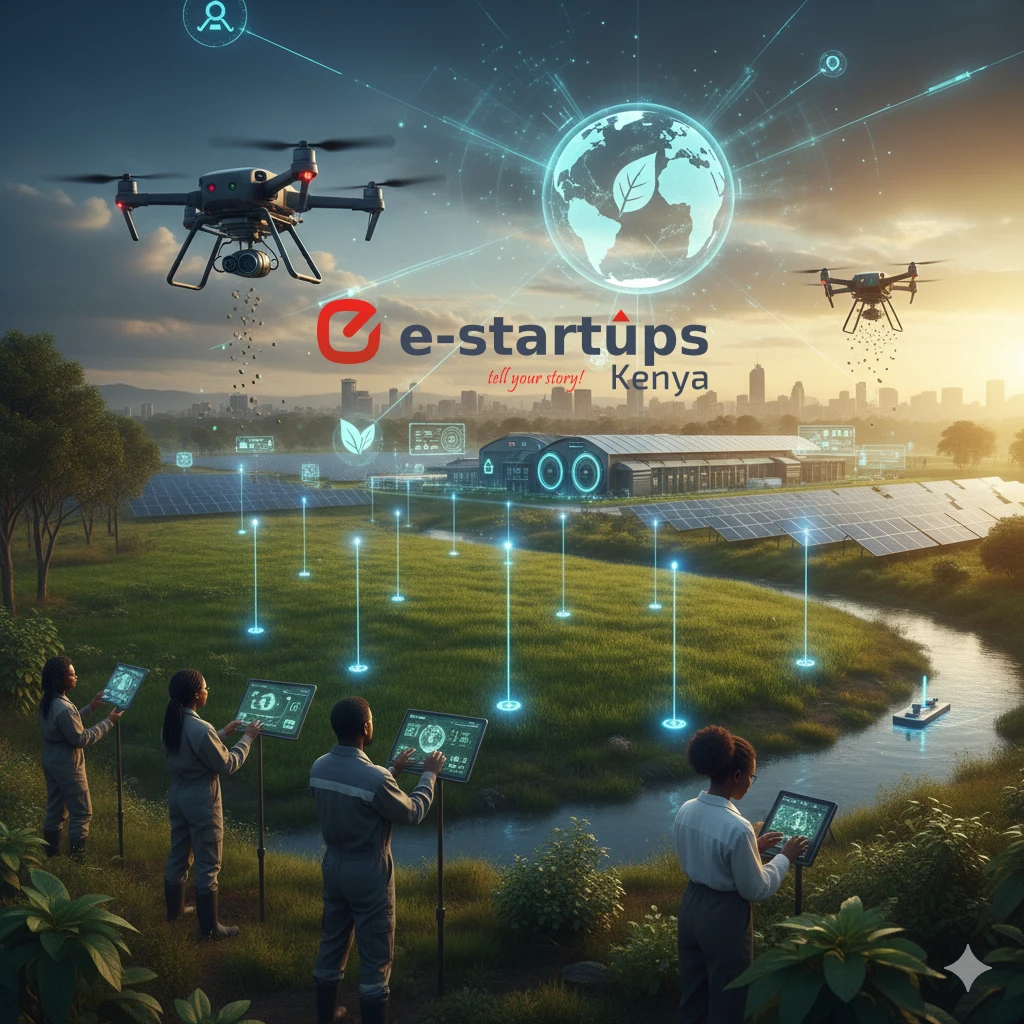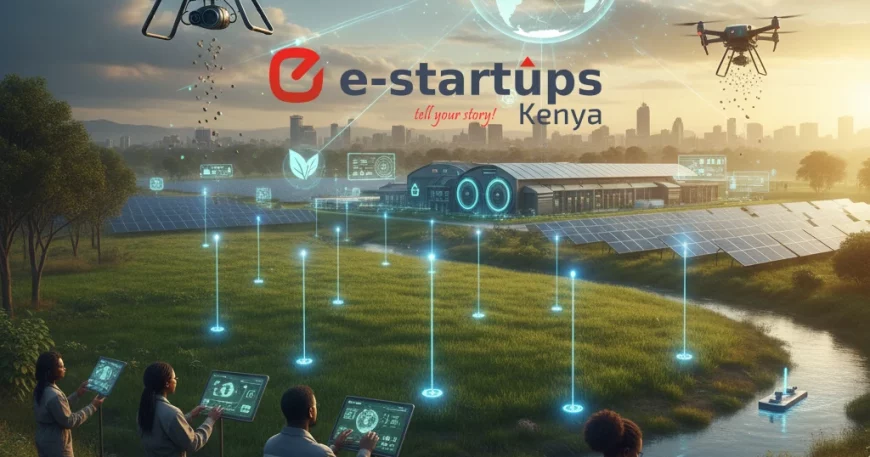How Tech Is Solving Environmental Challenges in Kenya
Kenya is at the frontline of Africa’s climate fight. From unpredictable rainfall patterns to plastic waste and deforestation, the country faces environmental challenges that directly impact lives and livelihoods. But here’s the bright side — technology is emerging as one of Kenya’s strongest weapons in protecting the environment.
Today, from smart agriculture to clean energy innovations, tech-savvy Kenyans are using creativity and digital tools to turn environmental problems into opportunities. It’s no longer about waiting for solutions from abroad — they’re building them right here, at home.
Why Environmental Tech Matters in Kenya
Kenya’s economy relies heavily on agriculture, tourism, and natural resources. When the environment suffers, so does the economy. For instance, irregular rainfall affects smallholder farmers, plastic waste clogs drainage systems, and pollution lowers the quality of air and water in cities.
Technology offers something different — scalable solutions. It allows innovators to track, predict, and solve environmental problems faster and more efficiently. For example, drones and sensors can monitor forests in real time, while digital platforms can educate farmers on sustainable practices.
According to the UN Environment Programme (UNEP), Kenya loses about 2.6 percent of its GDP annually due to environmental degradation. That’s a major wake-up call. The rise of green tech startups is changing that narrative — creating jobs, protecting ecosystems, and positioning Kenya as a sustainability leader in Africa.

Areas Where Technology Is Making the Biggest Impact
Kenyan innovators are using tech to drive change across multiple sectors.
I. Smart Agriculture
Agriculture remains Kenya’s economic backbone, but climate change has made farming unpredictable. Tech-driven startups like FarmDrive and iCow use mobile technology and data analytics to help farmers manage risks, access credit, and adopt eco-friendly practices. Farmers can now receive real-time weather alerts, learn about soil health, and even connect with markets directly.
II. Renewable Energy and Clean Power
Solar energy companies like M-KOPA and SunCulture have revolutionized access to clean energy. By using IoT devices and mobile payment systems, they allow households and farmers to access affordable solar solutions through flexible payment models. These innovations reduce reliance on fossil fuels while improving livelihoods in rural areas.
III. Waste Management and Recycling
Tech startups are tackling waste head-on. Platforms such as TakaTaka Solutions and Mr. Green Africa use digital tracking systems to manage collection, recycling, and sorting efficiently. They connect waste collectors to recyclers, ensuring more waste is processed and less ends up in dumpsites.
IV. Water Conservation and Management
Water scarcity remains one of Kenya’s toughest environmental issues. Smart water systems are emerging, powered by IoT sensors that detect leaks, measure water quality, and monitor consumption in real time. Startups like HydroIQ have developed digital “smart meters” that use mobile payments to make water usage transparent and efficient.
V. Reforestation and Conservation
Organizations are now leveraging drones and satellite imagery to monitor forests and track deforestation. Apps help volunteers report illegal logging and tree-cutting, while blockchain-based solutions are being tested to verify tree-planting efforts.

The Power of Data and Artificial Intelligence
One of the most exciting shifts is how AI and data are helping Kenya predict and manage environmental changes. Machine learning algorithms can analyze weather trends, detect pollution patterns, and optimize renewable energy systems.
For example, AI-powered predictive tools can forecast floods and droughts, allowing communities to prepare early. In Nairobi, AI models are already helping analyze air quality data collected through smart sensors placed in high-traffic areas.
Data-driven decision-making has moved from a luxury to a necessity. With reliable insights, both governments and startups can make smarter, faster, and more impactful environmental interventions.

Green Tech Success Stories from Kenya
Kenya’s growing green tech ecosystem is producing incredible success stories.
BioLite Kenya provides clean cookstoves that use less fuel and emit fewer pollutants, improving air quality in homes.
Koko Networks uses smart fuel dispensers for ethanol-based cooking, reducing dependence on charcoal and kerosene.
Solar Freeze supports small farmers with solar-powered cold storage, reducing post-harvest losses and food waste.
EcoPost turns plastic waste into durable building materials like fencing posts, creating jobs while reducing pollution.
Each of these solutions proves that environmental sustainability and profitability can go hand in hand — a vision shared by Kenya’s new generation of innovators.

The Role of E-Startups Kenya in Supporting Environmental Innovation
At E-Startups Kenya, we believe technology is the key to a sustainable future. We work with green entrepreneurs, NGOs, and eco-focused startups to build powerful digital ecosystems that support their missions.
We help innovators through:
I. Website and eCommerce development that showcases their solutions and attracts investors or partners.
II. Cloud and CRM systems that streamline operations and track environmental impact in real time.
III. SEO and digital marketing that increases visibility for eco-driven businesses and amplifies their impact stories.
IV. AI and automation tools that help analyze data, predict trends, and improve decision-making.
V. Payment integrations such as M-Pesa and Airtel Money that enable easy transactions for rural customers.
With the right digital backbone, environmental innovators can move from local impact to nationwide influence — and that’s where E-Startups Kenya comes in.

FAQs
1. What is environmental technology?
Environmental technology (or green tech) refers to innovations that help reduce pollution, conserve resources, and promote sustainability.
2. How is Kenya using tech to fight climate change?
Through renewable energy, smart farming, waste management systems, and AI-based climate prediction tools. These innovations make Kenya a regional leader in green technology.
3. Are green tech startups profitable?
Yes. Many green tech ventures operate as social enterprises that generate revenue while delivering environmental and social impact.
4. How can E-Startups Kenya support my eco project?
We help build and scale digital systems — from websites and data tools to AI-powered analytics — that support environmental innovation.
5. What are the biggest challenges for green tech startups?
Funding, lack of infrastructure, and limited awareness are common barriers. However, technology and collaboration continue to break these limits.
Conclusion
Kenya’s fight against environmental challenges is being won one innovation at a time. From solar power to data-driven conservation, technology is proving that sustainability and progress can thrive together.
As more innovators rise, the future looks greener and smarter. If you’re an environmental entrepreneur ready to amplify your impact, partner with E-Startups Kenya. Together, we can build digital solutions that protect our planet and power a sustainable tomorrow.
E-Startups Kenya — building tech that makes a difference.




























